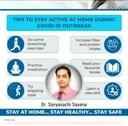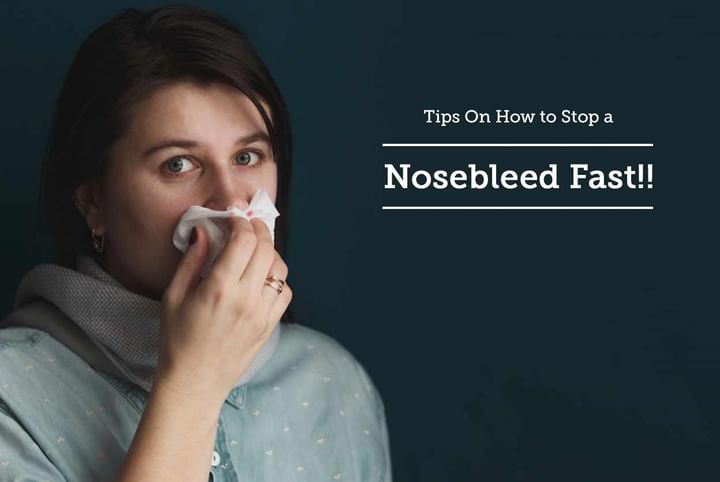Tips On How to Stop a Nosebleed Fast!
Nosebleed is a condition wherein blood vessels burst in the nasal lining. Nosebleeds are fairly common and it is rarely a serious condition.
- Anterior nosebleed: It is caused by the eruption of a blood vessel at the tip of the nose. Anterior nosebleeds are generally easy to control by yourself or by a doctor.
- Posterior nosebleed: It is a rare type of nosebleed. Posterior nosebleed mostly occurs in older people. It occurs when an artery bursts behind the nose, which causes the blood to flow down the throat. Posterior nosebleeds are, thus, dangerous, and they need immediate medical attention.
Causes:
- There are numerous causes of nosebleeds. The most common cause of nosebleeds is dry air. Dry climates dehydrate the nasal membranes (internal nasal tissues). This dryness leads to crusting which can cause irritation or itching.
- Also, if you pick or scratch your nose too much, it can start to bleed.
- Decongestants for allergies, sinus infection or cold and antihistamines can make the nasal membranes dry and cause nosebleeds as well.
Some other causes of nosebleeds include:
- Some sort of foreign object stuck in the nasal cavity
- Allergic reactions
- Repeated sneezing
- Nose injuries (For example, car accidents, a punch to the face, etc.)
- Chemical irritants
- Cold air
- Respiratory Infection
- Consuming high doses of aspirin-high dosage thins the blood down, thus triggering nosebleeds
There are other rarer causes as well, such as:
- High blood pressure
- Bleeding disorder
- Blood clotting problems
- Cancer
There are various type of nosebleed that can be caused by a variety of conditions. While some of them may not be too serious, one must never ignore heavy and persistent nosebleed. Nosebleeds are of two kinds: anterior nosebleed and posterior nosebleed. While 90% of all nosebleeds are anterior nosebleeds, the posterior nosebleeds are far less common and may be slightly more serious in nature. An anterior nosebleed is usually caused in the blood vessels that lie on the front portion of the nose and can be controlled easily. A posterior nosebleed usually comes from damage to an artery in the rear portion of the nose. Infection, trauma, allergic reactions and other such causes may be behind a nosebleed.
Let us cast a glance on the tips to prevent nosebleeds.
- Salt water and saline nose drops can be used in order to prevent nosebleeds. It is important to take these on a regular basis in case you are experiencing these nosebleeds on a regular basis.
- You can also visit your doctor, who may prescribe blood thinners so that the blood does not clot and lead to a nosebleed. You will need to ensure that you take such medication only when the doctor prescribes the same.
- The use of painkillers like Aspirin and other non-steroid anti-inflammatory drugs must be limited. Sometimes, taking such medication too frequently may lead to nosebleeds.
- You would do well to control your blood pressure because hypertension and other forms of high blood pressure can also cause nosebleeds. Lifestyle changes like your diet and exercise can help in keeping a more stable blood pressure level so that you do not fall prey to frequent nosebleeds.
- Humidify your home with a humidifier so that the air does not get too dry. Many times, this causes nosebleeds. Also, you may want to keep the heat down in the bedrooms. Many nosebleeds happen due to too warm temperatures while you are sleeping.
- Nose picking should also be discouraged as it can lead to nosebleeds in case there is a scratch or any other kind of damage when you try to force the dirt out.
- It has also been found that smoking has a connection with nosebleeds. This can be fixed if the patient quits smoking.
- One should not use nasal sprays without a prescription from a doctor. This also includes antihistamines, decongestants as well as other medicated sprays. These may not suit the patient at all times, and may also lead to nosebleeds.
In the event of a nosebleed, you will need to lean forward with your head tilted backwards. This will stem the bleeding. If it is possible, you must also try and lie down immediately for a few minutes. If you wish to discuss about any specific problem, you can consult an Ent Specialist.



+1.svg)
